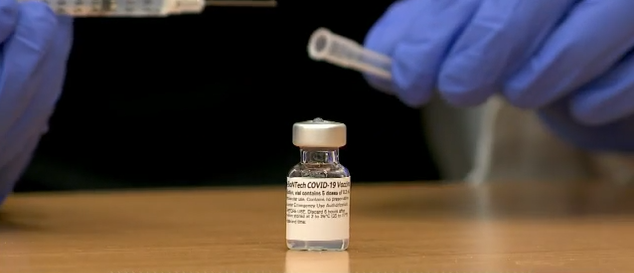
17 September 2021. ABC News: On Friday, an advisory panel for the Food and Drug Administration will weigh in on a debate that has been broiling since the Biden administration announced last month that the country would begin to roll out booster shots against COVID-19.
This panel, which is independent of the FDA and the Biden administration, will look at the data recently submitted by Pfizer on booster shots and make a recommendation. The FDA will then decide whether they will formally amend their current vaccine approval for Pfizer, and the Centers for Disease Control and Prevention, which has its own advisory committee, will review the information and make a decision.
But the back-and-forth leading up to this process, and the president’s involvement in an otherwise non-political decision, has left many Americans confused about who really needs boosters and when.
Do I need a booster shot, and if so, when?
Unfortunately, there’s no clear answer to this question yet. But it will come sometime in the next week, as the FDA and CDC’s advisory committees discuss the available data.
For now, the one thing to know is that the vast majority of vaccinated people are still well-protected by their vaccines.
“If you have a good immune system, I would certainly not go out and get a booster before anything is recommended. I feel strongly that we have to go by the scientific consensus, which really hasn’t been played out yet,” said Dr. Paul Goepfert, director of the Alabama Vaccine Research Clinic at the University of Alabama.
The latest CDC data found that over 90% of people hospitalized with COVID are still unvaccinated.
And while breakthrough infections happen, particularly as protection against mild infection wanes, the vaccines continue to protect Americans from ending up in the hospital with COVID, as well as vastly reducing their likelihood of death.
The only group that’s potentially at more risk of a serious breakthrough infection are older people who got their vaccines early on in the rollout. Recent studies by the CDC showed that protection against hospitalization for people over 65 has decreased to around 76-80%.
“At the end of the day, the purpose of the vaccines is to prevent hospitalizations and deaths, and they’re doing that very effectively still,” said Dr. Carlos Del Rio, executive associate dean of Emory University School of Medicine.
“Maybe a little less effective for people over the age of 60 or with comorbidities, but still, if you look around the hospitals, the people hospitalized today are people who haven’t received the vaccine.”
Additional vaccine doses, although not quite a booster, have already been approved by the CDC for the roughly 7 million immunocompromised Americans who didn’t have an optimal response to the first round of mRNA vaccines. Nearly 2 million Americans have gotten an additional shot since the FDA and CDC approved them in August for that subset of people.
The CDC officially recommended a third dose of an mRNA vaccine for immunocompromised Americans in August, allowing the approximately 7 million Americans who didn’t get an optimal immune response to their initial vaccine doses of Pfizer or Moderna to gain more protection.
There’s been a lot of debate as the process plays out. What’s the controversy?
When the Biden administration announced that it would roll out a booster shot program beginning Sept. 20, the White House’s COVID response team said it was to get ahead of the virus.
“You don’t want to find yourself behind, playing catch up,” Dr. Anthony Fauci, the nation’s top infectious disease expert, said when announcing the plan. “Better stay ahead of it than chasing after it.”
The White House has relied heavily on Israel’s progress. Data from the country, where the vaccine process began sooner than in the U.S., shows that vaccine protection against serious disease has now begun to wane.
But quickly, career scientists pushed back on the White House’s announcement, saying there wasn’t enough U.S. data to support boosters yet — all the current evidence shows vaccines still protect most Americans against serious disease.
For experts in that camp, the focus usually narrows in on the 80 million Americans who aren’t vaccinated at all. Increasing protection across more of the country would stamp out transmission.
“We’re spending way too much time talking about boosters when we need to be spending time talking about the people that haven’t been vaccinated,” said Del Rio.
But on the other hand, studies do show that general protection against mild infection is waning, even if it’s staying strong against hospitalization.
“We need to reinforce the armor,” said Dr. Todd Ellerin, an ABC News medical contributor and the director of infectious diseases at South Shore Health in Massachusetts.
Ellerin predicted a triple threat ahead: a surge of delta infections, higher transmission during the winter months and close to half the country remaining unvaccinated.
“I think there are strong arguments for both sides and we just have to see,” Ellerin said.
The FDA’s independent advisory committee meets all day on Friday, and plans to vote in the late afternoon. For now, they’re only meeting about Pfizer, the first vaccine to submit its data.
If the FDA panel votes to move forward with boosters, the CDC’s advisory committee will meet almost a week later to nail down the details: who gets boosters and how soon.
The FDA and CDC committees are looking at Pfizer booster shots. What’s the deal with boosters for people who got J&J or Moderna?
Both Johnson & Johnson and Moderna are expected to follow Pfizer and run their data by the official FDA and CDC channels in the coming weeks in an effort to get approval for booster shots.
But both companies maintain protection is still strong against severe infection.
Moderna, in an analysis of various studies released on Wednesday, even made the case that the company’s original vaccine appears to generate the strongest protection among the three currently authorized vaccines.
Nevertheless, Moderna President Stephen Hoge told ABC News in an interview on Wednesday that “protection is not permanent” and “we’re not going to be able to defy gravity forever.”
Newly published data from Moderna’s booster shot trial showed a lower risk of breakthrough infections among people vaccinated eight months ago compared to people vaccinated 13 months ago.
Unlike Pfizer, Moderna’s third booster will be a half-dose. They say their data shows that boosting with a half-shot seems to generate more than enough immune response.
For J&J, the one-shot series chosen by about 14 million Americans, a study found that the vaccine still provided a durable immune response at least eight months later, even without a booster dose.
Another study, not yet peer reviewed, found more good news: The J&J booster dose actually boosted antibody levels higher than they were after the initial shot.
And while it will be a few weeks before there’s more concrete news on the J&J booster shots, there’s room in the timeline. Most Americans didn’t receive the J&J vaccine until late spring of 2020, since it was approved after the mRNA vaccines. That means the J&J boosters won’t be widely necessary until November at the earliest — if the FDA and CDC decide they’re needed at all.
There is not enough data yet on mixing and matching vaccines, though the CDC is actively researching it.
And for all three of the vaccines, recipients have a common question: will I need to get a booster routinely? Experts, wary of predicting anything about the unpredictable global pandemic, said it’s possible, but unlikely.
“My prediction is that as long as the COVID rates are going down, we will not need a continuous boost,” Goepfert said. That could change, however, if a new viral strain requires a newly tailored vaccine.
Are booster shots safe?
Pfizer, the only vaccine so far to have its data reviewed by the FDA, found no safety concerns among the 300 trial participants who were part of its clinical trial. Pfizer followed the participants for up to three months after getting their third shot.
Peoples’ reactions to the booster shots were not significantly different from their reactions to a second dose, FDA and Pfizer both wrote in their separate briefing documents.
“No deaths, vaccine-related serious adverse events, or events of myocarditis, pericarditis, anaphylaxis, appendicitis, or Bell’s palsy were reported among study participants who received the … booster dose,” the FDA wrote in a review of Pfizer’s safety data.
Moderna and J&J have not yet had their data reviewed by the FDA, but have said they found no safety concerns in their clinical trials of booster shots.




